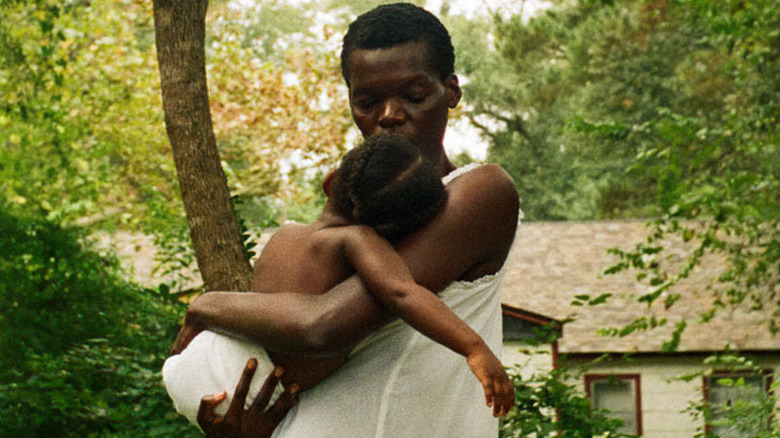All Dirt Roads Taste Of Salt Review: A24's Most Avant-Garde Feature
- So beautiful you want to touch it
- Interesting nonlinear editing
- The characters remain at a distance
Indie distributor A24 has developed a talent for selling artier films to the multiplex masses. From risk-taking horror like "The VVitch" and "Midsommar" to diverse dramas like "Moonlight" and "The Farewell" to weird genre experiments like "The Green Knight" and "Everything Everywhere All at Once," they've been a godsend for successfully promoting movies that the major studios wouldn't touch. But despite the company's semi-mainstream hipster popularity (and recent Academy Awards nomination domination), some of its productions are less likely to find such crossover appeal.
"All Dirt Roads Taste of Salt," which just premiered at the 2023 Sundance Film Festival, feels like one of A24's artiest and most experimental films. Directed by Raven Jackson and produced by "Moonlight" director Barry Jenkins through his production company Pastel, it isn't "weird" in the way typically associated with the A24 brand, but it completely resists traditional narrative in favor of what could be described as visual poetry.
The story, in as much as one can say there is one, follows the life of Mack (played by Kaylie Nicole Johnson as a child and Charlene McClure as an adult), a Black woman growing up in Mississippi from the 1960s through the 1980s. We get glimpses of Mack's relationships with her sister Josie (Jayah Henry as a child, Moses Ingram from "Obi-Wan Kenobi" as an adult), her mother Evelyn (Sheila Atim from "The Woman King"), her father Isaiah (Chris Chalke), and her boyfriend Wood (Reginald Helms Jr.). But the events of Mack's life are presented as non-linear fragments; this is not a film about the plot but rather about capturing experiences.
One of the most tactile films ever made
The first image we see in "All Dirt Roads Taste of Salt" is of young Mack stroking the scales of a fish she's caught with her dad. In this opening fishing scene, there are more tactile images: pulling on a line, feeling the dirt in the water. The opening establishes touch and texture as the primary language of the film. I wasn't counting, but I would not be shocked if somewhere around a third of all shots in this movie were primarily focused on hands.
Shot on 35mm film by Jomo Fray, "All Dirt Roads Taste of Salt" sometimes plays like the world's most beautiful stimming video. There's a hypnotic and calming quality to the imagery, which is enhanced by a soundscape of natural sounds. There are many times you'll just want to reach out and touch the imagery — if "Avatar: The Way of Water" leads to a resurgence in auteur-driven 3D movies, I'd honestly be really excited to see what Jackson could do with 3D based on this quality. The movie flows at a slow pace, and some scenes go on for a long time, but there's a reason for these long takes: The full length of a hug or a glance or even a moment of loneliness tells us something about the people involved and their emotional state.
One of the more curious artistic choices that Jackson and Fray have made is that when the film isn't focused on the actors' hands, it is often focused on the backs of their heads. It becomes easier to recognize characters from their hairstyles than their faces, and centering hair so much adds to the emphasis on visual texture. The camera almost seems to be avoiding eye contact; characters will look at each other when talking but hardly ever in the direction of the camera. For a film that feels so up close and personal in some senses, there's an unusual sense of distancing in this regard.
More character detail could have made this better
Because of its resistance to a traditional narrative, some might dismiss "All Dirt Roads Taste of Salt" as a film where "nothing happens." Those people would be wrong. There's always something happening in the film, not just the minutia of physical actions but also big life events, births, deaths, weddings, and goodbyes. Where the movie struggles is in building fuller connections with its characters that would heighten the dramatic interest in piecing together the nonlinear timeline.
After watching the film, I have some sense of how Mack relates to the other characters, but I don't know if I could really tell you who she is in general. Perhaps she's meant as something of a blank slate in the name of relatability, and there is a universality to following her romance with Wood. The most intriguing scene narratively is a heart to heart between Mack and Josie that nonetheless feels a bit too disconnected from the rest of the movie to give us the context we would need to latch onto it in a deeper sense.
A24 and Pastel's previous coproduction, Charlotte Wells' "Aftersun," was also a directorial debut with a slow slice-of-life sensibility. Like "All Dirt Roads Taste of Salt," "Aftersun" could test some viewers' patience, but by the end of Wells' film, everything snaps into place to a point where anyone who sees it will basically "get it" — and probably cry. "All Dirt Roads Taste of Salt" has no such moment of everything clicking together. As a discussion about the nature of water in the film's final scenes indicates, a sort of formlessness seems to be part of the overall point. This is a beautiful avant-garde experiment, but I look forward to seeing if Jackson's next film is able to offer a greater depth of character.
Release plans for "All Dirt Roads Taste of Salt" have yet to be announced.


